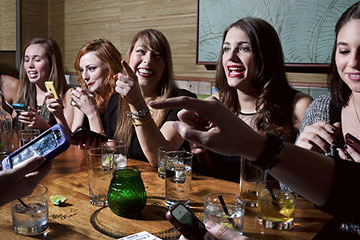
A group of girlfriends gathers at Babys All Right, a Brooklyn bar, to play a Tinder drinking game.
(2 of 4)
Tinder won't disclose its total number of users, though co-founder Justin Mateen says it has added 1 million in the U.S. during the past 60 days. Around the world, users--the majority of whom are 18 to 24--swipe about 500 million times a day. And they're split pretty evenly between men and women, according to the company.
While Tinder popularized dating apps, the trend began in 2008 with Grindr, a location-based app for gay men. A fall report from the Pew Research Center found that 1 in 10 Americans has used a dating site or app, and new companies are proliferating to meet the demand. Hinge, which launched a year ago, offers a more limited number of daily matches culled from your pool of acquaintances--like a party at a friend's house compared with other apps' huge, loud clubs. Hinge users receive just five to 15 matches per day, delivered at noon. "The countdown creates a trigger in people's minds," says Justin McLeod, the company's founder and CEO. He credits the popularity of the game Farmville with conditioning people to play appointment-style games. "If you don't water your plants at 3, they'll die," he says.
Let's Date, a 16-month-old app, lets users guess who liked their profiles from a series of options. Guess correctly and you're rewarded with the option to connect. Zoosk, another entrant, has incorporated digital currency, gift giving, rewards and countdown clocks to keep people using its product. The six-year-old service now has 25 million members, and its app is consistently one of the top 20 highest-grossing in the iTunes store.
The Games Inside the Game
I kept swiping on Tinder after that first train ride partly because I was single and looking but also because these apps are a millennial's fantasy. Instant connections! New friends! Constant affirmation! Rejection is conveniently (and quickly) erased because you see only matches, and there are so many pairings that I didn't take it personally if some swipes weren't reciprocated. And it didn't really matter whether the endorphin hit came from an eagerness to date a match or simply because I felt I'd somehow already won by getting a Like.
This is, apparently, normal. Catalina Toma, a professor of communications at the University of Wisconsin and an expert in the social and psychological effects of online dating, explains the addictive rush in terms of what psychologists call operant conditioning. "You get a reward"--here, a match--"on a variable schedule, [not knowing] when it's going to happen. It's like playing slots at a slot machine. You keep trying it out, and sometimes you get a reward and sometimes you do not. And the fact that your behavior gets rewarded sometimes incentivizes you to play more because you think it might come at any moment."
Not every user, however, is hooked by the prospect of finding love. My friend Danny has an ongoing text-message chain with his friends sharing pictures of women on Tinder who seem to embody the meme of the moment. That gave rise to their Tumblr blog devoted to pictures of women posing with fake mustaches on Tinder. Josh Dubin, 19, a sophomore at Washington University in St. Louis, says he and his friends use the app for juvenile bets. One involved competing to be the first to hook up with a girl they met through Tinder. Another revolved around the procurement of naked pictures.
